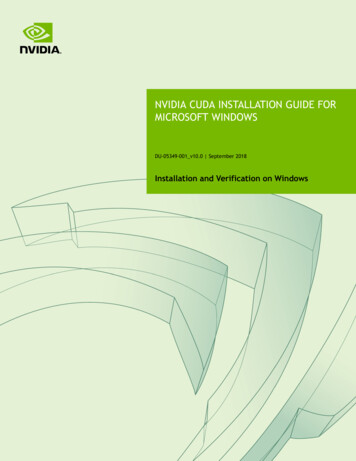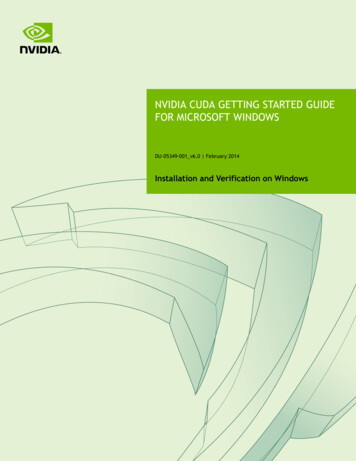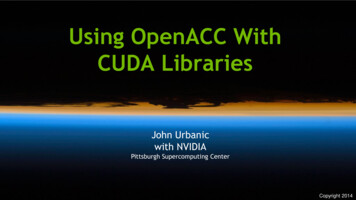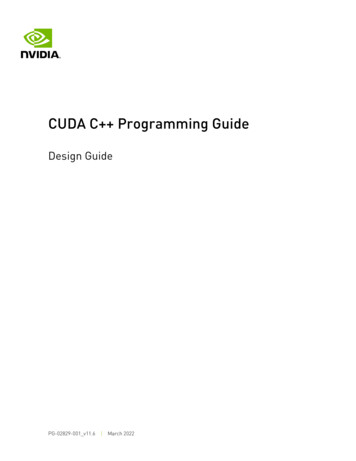
Transcription
Introduction to Numerical General Purpose GPUComputing with NVIDIA CUDAPart IICUDA C/C Language Overview andProgramming TechniquesRaphael Münster TU DortmundPage ‹#›
Outline GPU-Helloworld CUDA C/C Language Overview (with simple examples) The nvcc compiler Integration of CUDA code into existing projects Debugging (return codes, printf, cuda-memcheck, cuda-gdb) Intermediate Example: Heat Transfer Atomic Operations Memory Transfer (Pinned memory, Zero-Copy host memory) CUDA accelerated libraries:Raphael Münster TU DortmundPage ‹#›
CUDA Resources Documentation Local: in /sfw/cuda/7.5/doc/pdf CUDA C Programming Guide.pdf CUDA C Getting Started.pdf CUDA C Toolkit Release.pdf Online CUDA API Reference: .html CUDA Toolkit Download for personal installation: https://developer.nvidia.com/cuda-downloadsRaphael Münster TU DortmundPage ‹#›
CUDA API API application programming interface Set of functions for various GPU tasks: Memory allocation Error checking Host-Device synchronization Functions included in C-style: #include cuda runtime.h Link with –lcudart (not neccessary if using nvcc) Basic functions covered in this courseRaphael Münster TU DortmundPage ‹#›
CUDA Hello World!(I)#include stdio.h // Cuda supports printf in kernels for // hardware with compute compatibility 2.0global void helloworld(){// CUDA runtime uses device overloading// for printf in kernelsprintf("Hello world!\n");}int main(void){helloworld 1,1 ();return 0;}Raphael Münster TU DortmundPage ‹#›
CUDA Hello World – The kernelglobal void helloworld(){printf("Hello world!\n");} Kernel: A function with the type qualifier global Executed on the GPU void return type is required Syntax:global functionName (parameters)Raphael Münster TU DortmundPage ‹#›
CUDA Hello World – The launcher int main(void){helloworld 1,1 ();return 0;}Executes on the hostKernel call followed by x,y syntaxUser-defined C/C function (here: main)Passes arguments to kernel (here: void)Common design in GPU accelerated codes: Launcher/Kernel pairs Compilation:nvcc helloworld.cu –o helloworldRaphael Münster TU DortmundPage ‹#›
CUDA Hello World – Problems No output writtenApplication terminated before GPU code executionAsynchronous kernel launchHost needs to wait for the device to finishSynchronization: cudaDeviceSynchronize() Blocks until the device has completed preceding tasksint main(void){helloworld 1,1 ();cudaDeviceSynchronize();return 0;}Raphael Münster TU DortmundPage ‹#›
Simple Programm Vector Addition#include stdio.h vector add.cu#include cuda runtime.h #define N 10global void add(int *a, int *b, int *c) {int tid blockIdx.x;if (tid N)c[tid] a[tid] b[tid];}int main(void) {int a[N], b[N], c[N];int *dev a, *dev b, *dev c;cudaMalloc((void**)&dev a, N * sizeof(int));cudaMalloc((void**)&dev b, N * sizeof(int));cudaMalloc((void**)&dev c, N * sizeof(int));for (int i 0; i N; i) {a[i] -i;b[i] i * i;}cudaMemcpy(dev a, a, N * sizeof(int), cudaMemcpyHostToDevice);cudaMemcpy(dev b, b, N * sizeof(int), cudaMemcpyHostToDevice);add N,1 (dev a, dev b, dev c);cudaMemcpy(c, dev c, N * sizeof(int), cudaMemcpyDeviceToHost);cudaFree(dev a);cudaFree(dev b);cudaFree(dev c);return 0;}Raphael Münster TU DortmundPage ‹#›
GPU kernel vs CPU kernelGPUglobal void add(int *a, int *b, int *c){int tid blockIdx.x;if (tid N)c[tid] a[tid] b[tid];}/*Other code*/add N,1 (dev a, dev b, dev c);Launches the kernel with N 10blocks with 1 thread per block.Threads are executed in parallel.CPU#define N 10void add(int *a, int *b, int *c){for (int i 0; i N; i)c[i] a[i] b[i];}Raphael Münster TU DortmundLoop is executed N 10 times in aserial manner.Page ‹#›
Getting Information on the GPUgpu properties.cu--- General Information for device 0 --Device 0: GeForce GTX 980 TiCUDA capability Major.Minor version: 5.2Total global mem: 6143 MBytes (6441730048 bytes)GPU Max Clock rate: 1190 MHz (1.19 GHz)Memory Clock rate: 3505 MhzMemory Bus Width: 384-bitTotal constant memory: 65536 bytesShared memory per block: 49152 bytesRegisters per block: 65536Warp size: 32Max memory pitch: 2147483647 bytesTexture Alignment: 512 bytesMultiprocessor count: 22Max threads per block: 1024Max thread block dimensions (x,y,z): (1024, 1024, 64)Max grid dimensions (x,y,z): (2147483647, 65535, 65535)Concurrent copy and kernel execution: EnabledRun time limit on kernels : EnabledRaphael Münster TU DortmundPage ‹#›
CUDA C/C language components Host side language support C/C standard which is supported by the hostcompiler Host side language extensions Launcher syntax .,. add N,1 (dev a, dev b, dev c);Raphael Münster TU DortmundPage ‹#›
CUDA C/C language componentsHost side language extensions: Predefined short vector types Float4, char4, etc. Constructors: make int2(int x, int y) Available in host and device code Access components by .x, .y, .xy, .xyz, etc. See CUDA Toolkit Documentation: fined-typesRaphael Münster TU DortmundPage ‹#›
CUDA C/C language componentsDevice side language support C99: Full support C 03 C features: Classes Derived classes (no virtual member functions) Class and function templates No rtti No exception handling No STLRaphael Münster TU DortmundPage ‹#›
CUDA C/C language componentsDevice side language support Since CUDA 7.0: C 11 auto: deduction of a type from initializer initializer lists ranged-based for loops Lambda functions Full Details: Appendix E of programming guideRaphael Münster TU DortmundPage ‹#›
CUDA C/C language componentsglobal void add(int *a, int *b, int *c)Devide side: function type qualifiers global Declares a kernel GPU function that can be called from the host For compute capability 3.5:Callable from device too Has to be declared void No recursion No variable number of argumentsRaphael Münster TU DortmundPage ‹#›
CUDA C/C language componentsDevide side: built-in variables gridDim: dim3, dimension of current grid blockIdx: unit3, block index in current grid blockDim: dim3, dimenions of current block threadIdx: uint3, thread index in current block warpSize: int, size of a warpglobal{int tid if (tid c[tid] }Raphael Münster TU Dortmundvoid add(int *a, int *b, int *c)blockIdx.x;N)a[tid] b[tid];Page ‹#›
CUDA C/C language componentsDevide side: function type qualifiers device Declares a function callable from device only Recursion supported for compute capability 2.x For compute capability 3.5: Has to be declared void No recursion No variable number of argumentsdevice int iadd(int a, int b){return a b;}Raphael Münster TU Dortmundglobal void add(int *a, int *b, int *c){int tid blockIdx.x;if (tid N)c[tid] iadd(a[tid], [tid]);}Page ‹#›
CUDA C/C language componentsDevide side: function type qualifiers host Can be called from host only Default unqualified behavior device host creates device and host versionhost device float ceilf ( float x ) host devicefloat cosf ( float x )Raphael Münster TU DortmundPage ‹#›
CUDA C/C language componentsDevide side: variable type qualifiers devicedevice float pi 3.141592; Variable in global device memory Lifetime of application Accessible by all threads all the time: Communication Race conditions or deadlocks Needs synchronization or atomic operations (later) Can be accessed from host by API functions: cudaMemcpyToSymbol(), cudaMemcpyFromSymbol()Raphael Münster TU DortmundPage ‹#›
CUDA C/C language componentsCUDA Math API Always callable from device code ( hostdevice ) Similar to cmath functions with explicit single/doubleoverloads: sinf( float x) / sin( double x) powf( float x) / pow( double x) No includes neccessary when compiling with nvccRaphael Münster TU DortmundPage ‹#›
CUDA C/C language componentsIntrinsics ( host device ) functions may needmore instructions on the device to meetaccuracy requirements device qualified functions For many standard functions there is an intrinsicfunction with fewer instructions, but reducedaccuracy sinf( float x) / sinf( float x)Raphael Münster TU DortmundPage ‹#›
Test our knowledge with anexampleAddition of long vectors vector add threads.cu vector add loop.cuRaphael Münster TU DortmundPage ‹#›
Extended Vector Add ExampleAddition of long vectors#define N (33 * 1024)global void add(int *a, int *b, int *c){int tid blockIdx.x * blockDim.x threadIdx.x;if (tid N)c[tid] a[tid] b[tid];}void launcher(){/* other code */int threadsPerBlock 128;int blocksPerGrid (N threadsPerBlock-1)/threadsPerBlock;add blocksPerGrid,threadsPerBlock (dev a, dev b, dev c);} Ok, but neither dimension of a grid of blocksmay exceed 65535 With 128 threads we get in trouble for vectorswith 65535 * 128 8388480 elementsRaphael Münster TU DortmundPage ‹#›
Extended Vector Add ExampleAddition of long vectors: alternativeglobal void add(int *a, int *b, int *c){int tid blockDim.x * blockIdx.x threadIdx.x;while (tid N) {c[tid] a[tid] b[tid];// blockDim.x: number of threads in x-blocks// gridDim.x : number of blocks in x-gridtid blockDim.x * gridDim.x;}}void launcher(){/* other code */int threadsPerBlock 128;int blocksPerGrid 128;add blocksPerGrid,threadsPerBlock (dev a, dev b, dev c);}Works without exceeding grid dimensionsRaphael Münster TU DortmundPage ‹#›
CUDA C/C language componentsCUDA code can: Contain CPU code (host code) Variable declarations, memory allocation, CPU functions Macros, pragmas, defines Contain GPU code (device code) global kernel functions device functions Contain mixed code Launcher functions with kernel calls CUDA API structures, func x,y syntaxRaphael Münster TU DortmundPage ‹#›
The CUDA Compiler nvccnvcc treats these cases differently: Host (CPU) code: Uses a host compiler to compile (i.e. gcc) Compiler flags for the host compiler Object files linked by host compiler Device (GPU) code: Cannot use host compiler Fails to understand i.e. global syntax Needs nvcc Mixed Code: Cannot use host compiler, needs nvccRaphael Münster TU DortmundPage ‹#›
nvcc Compiler Design Similar usage to standard C/C compilers Compiler syntax Flags: Standard flags for generating debug infoor optimization: -g, -O3 Use the host compiler as much as possible Compiling CUDA applications is complicated Requires more steps to produce the binaryRaphael Münster TU DortmundPage ‹#›
nvcc Compilation Workflow nvcc is a compiler wrapper nvcc proceeds in separate phases throughthe compilation process Different phases can be executedmanually: Compile object files with desired flags Link into an executable Build a library with the libtool of the OSRaphael Münster TU DortmundPage ‹#›
nvcc Compilation PhasesPhase 1 Separation into host, device and mixed code nvcc processes code as C , not as CPhase 2: mixed code handling Launch syntax .,. handling: .,. is a convenience syntax Replace .,. by API calls to set parameters Result: Intermediate file similar to C Mixed code now passes as host code with API callsand library dependenciesRaphael Münster TU DortmundPage ‹#›
nvcc Compilation PhasesPhase 3: host code Takes generated and remaining host code asInput nvcc passes code to the host compiler Compilation by the host compiler Result: regular object filesPhase 4: device code Processing of CUDA kernels Compile with nvcc into device object filesRaphael Münster TU DortmundPage ‹#›
nvcc Compilation PhasesPhase 5: linking Combine host and device object files into anexecutable Uses the linker of the host compilerSummary Simple use of nvcc invokes all five phases Split compilation manually by compiler commands Check: nvcc –arch sm 20 helloword.cu –v –dryrun cc/Raphael Münster TU DortmundPage ‹#›
nvcc Compiling nvcc –cuda vector add.cu Produces vector add.cu.cpp.ii Resulting file can be compiled by host compiler Needs to link the CUDA runtime (cudart) Allows use of custom compilerAdding CUDA code to existing projects and build systems Use build system like CMake Makefile-based build systemsRaphael Münster TU DortmundPage ‹#›
Integrating CUDA into existing Makefile projectIntegrate CUDA into an existing Makefile project Existing source files Addition of some CUDA kernels No desire to replace all compiler calls by nvcc Place launcher declaration in header file(s)Header file: cuda extension.h#ifndef CUDAEXT#define CUDAEXTvoid launcher1(.);void launcher2(.);void launcher3(.);#endifRaphael Münster TU DortmundPage ‹#›
Integrating CUDA into existing Makefile project Write kernels and launchers to a new file cuda extension.cu Modify application code slightly: #include cuda runtime.h Allows use of CUDA API function calls #include cuda extension.h cuda extension.cuglobal void kernel1(.){//kernel code}void mylauncher1(.){// configure kernel launch// kernel launch// error checking} Call launcher functions from application code Link CUDA runtime (cudart) Reminder: code is treated as C , so extern “C“ syntax needs to beused in Fortran or plain C applicationsRaphael Münster TU DortmundPage ‹#›
Integrating CUDA into existing Makefile projectnvcc -c cuda extension.cu -o cuda extension.og -c appfile1.cpp -o appfile1.o -I/path/to/cuda/includeg -c appfile2.cpp -o appfile2.o -I/path/to/cuda/includeg -o app cuda extension.o appfile1.o appfile2.o -L/path/to/cuda/lib64 -lcudart Files are compiled separately nvcc only for CUDA code Relatively easy to integrate into Makefileprojects Possible problems: Mixes object files from different compilersRaphael Münster TU DortmundPage ‹#›
Alternative compilation for Makefile Projectsnvcc -cuda cuda extension.cug -c cuda extension.cu.cpp.ii -o cuda extension.og -c appfile1.cpp -o appfile1.o -I/path/to/cuda/includeg -c appfile2.cpp -o appfile2.o -I/path/to/cuda/includeg -o app cuda extension.o appfile1.o appfile2.o -L/path/to/cuda/lib64 -lcudart Remember: x.cu.cpp.ii files are guaranteed to becompilable by the nvcc host compiler -cuda: Replaces launcher syntax .,. by API functions Inlines API headers Generates device binaries Result: C source that can be compiled by hostcompilerRaphael Münster TU DortmundPage ‹#›
nvcc preprocessor macrosNVCC and CUDACC Test whether file is compiled by nvcc Test whether file is regarded as CUDA source Use same header for device and host codeCUDA ARCH Available only for device code#if CUDA ARCH 130// can use double precision#else#error "No double precision available for compute capability 1.3“#endifRaphael Münster TU DortmundPage ‹#›
Important compiler flags-c -o -I -L -l -D -v Same as in GCC-cuda -cubin -ptx -gpu -fatbin -link Execute a certain compilation stage-g -G Generate debug info for host device codeRaphael Münster TU DortmundPage ‹#›
Important compiler flags-Xcompiler -Xlinker Forward flags to host compiler and linker -Xcompiler -Wall,-Wno-unused-function-keep Keep intermediate files from various stages For debugging purposes-arch Create optimized code for specific computecapabilityRaphael Münster TU DortmundPage ‹#›
Important compiler flags-arch Guaranteed to work on higher compute capabilities Usage: -arch sm 11, -arch sm 20, -arch sm 35 Highly important compiler flag Includes future GPUs: If compiled with same major toolkit version If not set, the lowest supported instruction setarchitecture (ISA) is setRaphael Münster TU DortmundPage ‹#›
Important compiler flags-arch If not set other undesirable effects canhappen: No double precision if arch sm 13 No printf in kernels Set to something that supports the usedfeatures rely on PTX compiler in the driver for newerGPUsRaphael Münster TU DortmundPage ‹#›
GPU Dot Product Examplenv w vi wi for v, w R ni 1 Handle pairwise multiplication by threads Each thread handles a partial sum Join partial sums by a reduction operation Needs thread coorperation Store intermediate results in shared memory On chip low latency memory, shared between threads in a block Used for thread communication Needs synchronization to avoid race conditionsRaphael Münster TU DortmundPage ‹#›
GPU Dot Product Exampleconst int N 33 * 1024;vector dot.cuconst int threadsPerBlock 256;global void dot(float *a, float *b, float *c){shared float cache[threadsPerBlock];int tid blockIdx.x * blockDim.x threadIdx.x;int cacheIndex threadIdx.x;float temp 0;while(tid N) {temp a[tid] * b[tid];tid blockDim.x * gridDim.x;}cache[cacheIndex] temp;syncthreads();/* remaining code */}Raphael Münster TU DortmundPage ‹#›
GPU Dot Product Example/* other code */cache[cacheIndex] temp;syncthreads();/* remaining code */ Need to synchronize before joining sums syncthreads: Guarantees that every thread in the block has completedinstructions prior to the syncthreads call Can now safely join the partial sums byreductionRaphael Münster TU DortmundPage ‹#›
GPU Dot Product: Reduction Reduction: Common operation in parallelcomputing Complexity: proportional tolog of the array length threadsPerBlock must be apower of 2Image: Courtesy of NVIDIA Coorp log2(threadsPerBlock)reduction stepsRaphael Münster TU DortmundPage ‹#›
GPU Dot Product: Reduction Code/* preceeding code */cache[cacheIndex] temp;syncthreads();// Guaranteed: All writes to the shared memory cache finished// Reduction: threadsPerBlock has to be a power of 2int i blockDim.x/2;while(i ! 0) {if (cacheIndex i) {cache[cacheIndex] cache[cacheIndex i];}// make sure all writes are finishedsyncthreads();i / 2;}// Store the sum of the blocks in CUDA array accessible from// host codeif (cacheIndex 0)c[blockIdx.x] cache[0];}Raphael Münster TU DortmundPage ‹#›
GPU Dot ProductcudaMemcpy( dev a, a, N*sizeof(float),cudaMemcpyHostToDevice );cudaMemcpy( dev b, b, N*sizeof(float),cudaMemcpyHostToDevice );dot blocksPerGrid,threadsPerBlock ( dev a, dev b, dev partial c );// copy partial sums array from GPU to CPUcudaMemcpy( partial c, dev partial c, blocksPerGrid*sizeof(float),cudaMemcpyDeviceToHost );// add the partial sums on the CPUfloat c 0;for (int i 0; i blocksPerGrid; i ){c partial c[i];} Compute final result on CPU blocksPerGrid 32 Waste of resources to add 32 numbers onmassively parallel hardwareRaphael Münster TU DortmundPage ‹#›
Pitfalls Beware: Placement ofsyncthreads callint i blockDim.x/2;while(i ! 0) {if (cacheIndex i) {cache[cacheIndex] cache[cacheIndex i];}syncthreads();i / 2;} No thread will advance until everythread in the block has executedsyncthreads If-clause: thread divergence Result: deadlockRaphael Münster TU Dortmundint i blockDim.x/2;while(i ! 0) {if (cacheIndex i) {cache[cacheIndex] cache[cacheIndex i];syncthreads();}i / 2;}Page ‹#›
Thread DivergenceImage: Courtesy Kirk, David B. and Wen-mai, W: Morgan Kaufmann PublishersRaphael Münster TU DortmundPage ‹#›
Error Checking and Debugging C -style error checkingdouble *d;try {d new double[10000000000000];} catch (std::bad alloc &e) {std::cerr e.what() std::endl;} Error information encoded in exceptions Unhandled exection terminate programRaphael Münster TU DortmundPage ‹#›
Error Checking and Debugging C-style error checkingdouble *d (double*) malloc(1000000000000*sizeof(double));if(d NULL) {fprintf(stderror,"memory allocation error");exit(1);} Functions return error value Encode different errors with return values Example: malloc Pointer to the allocated memory or NULLRaphael Münster TU DortmundPage ‹#›
Error Checking and DebuggingCUDA API error handling API calls return a cudaError t Pitfall: kernel launches are an exception Pass cudaError t to an error handlingfunction Error handling function identifies exacterrorRaphael Münster TU DortmundPage ‹#›
Error Checking and DebuggingTwo options for error checking Use a global error checking function Make function available in a header file Use the preprocessor Can be combined with first optionvoid checkCudaErrors(cudaError t err, const char *userLabel) {if(cudaSuccess ! err) {fprintf(stderr,"checkCudaErrors() Driver API error %04d \"%s\" at user label \"%s\".\n",err, cudaGetErrorString(err), userLabel);exit(EXIT FAILURE);}}/* other code */checkCudaErrors(cudaMalloc((void**)&dev a,1*sizeof(int)),"allocating dev a");/* other code */Raphael Münster TU DortmundPage ‹#›
Error Checking and DebuggingUsing the preprocessor#ifndef checkCudaErrors#define checkCudaErrors(err) checkCudaErrors(err, FILE , LINE )void checkCudaErrors(cudaError t err, const char *file, const int line){if(cudaSuccess ! err) {fprintf(stderr,"checkCudaErrors() Driver API error %04d \"%s\" from file %s , line %i.\n",err, cudaGetErrorString(err), file, line);exit(EXIT FAILURE);}}#endif/* other code */int n &dev a, n * sizeof(int)));/* other code */Raphael Münster TU DortmundPage ‹#›
Kernel Errors CUDA kernel launches are synchronous Recall HelloWorld example CPU free to continue while GPU computes Kernel launches do not return cudaError t Launch errors, errors inside the kernel are notreported immediately A cudaError t is inserted into the error queue afterthe kernel finished Kernel launch failures will be reported by a subsequentAPI callRaphael Münster TU DortmundPage ‹#›
Kernel failuresHard to determine the faulty kernel API calls report an error that does notmake sense for the API function ULF „unspecified launch failure“Possible approach Synchronize after suspicious kernel calls cudaDeviceSynchronize() cudaGetLastError()Raphael Münster TU DortmundPage ‹#›
Kernel Debugging Can use traditional printf in kernel Use a minimal example with as little blocks/threads as possibleglobal void test(float *a, float *b, float *c, int n){int tid blockIdx.x * blockDim.x threadIdx.x;if(tid n) {c[tid] a[tid] b[tid];if(blockIdx.x 1 && threadIdx.x 0) {printf(" %f %f %f \n",a[tid],b[tid],c[tid]);}}} Can use assertion in kernels Needs cc 2.0 or higher All following host side API calls returncudaErrorAssertRaphael Münster TU DortmundPage ‹#›
Assertions#include assert.h global void testAssert(void){int is one 1;int should be one 0;// okassert(is one);// halts kernel executionassert(should be one);}int main(int argc, char* argv[]){testAssert 1,1 ();cudaDeviceSynchronize();return 0;}Raphael Münster TU DortmundPage ‹#›
gdb – GNU DebuggerGNU Debugger Set breakpoints, step through program Inspect and modify variables Examine program crash state / segfaults Print call stack / backtraces Can be attached to running applicationsRaphael Münster TU DortmundPage ‹#›
cuda-gdbcuda-gdb: GPU variant of gdb Included in GPU Toolkit Same functionality as CPU version The functionality is extended to kernels Inspect variable contents by block/thread/etc. Breakpoint per thread, warp, block, kernelRaphael Münster TU DortmundPage ‹#›
cuda-gdbDrawbacks Breakpoints halt entire GPU True for implicit and (segfault) and explicitbreakpointConsequence Halts X-server, machine locked Not possible on single-GPU CUDA 6, cc 5.0 Shutting down X not requiredRaphael Münster TU DortmundPage ‹#›
cuda-gdb GUI Frontendscuda-gdb drawbacks for multi-user systems cuda-gdb locks other users X processesGraphical frontends available Alinea DDT Eclipse Visual StudioRaphael Münster TU DortmundPage ‹#›
cuda-memcheck Equivalent of valgrind for CUDA GPUs Included in the toolkit Host and device correctness checking Synchronizes after every kernel callRaphael Münster TU DortmundPage ‹#›
cuda-memcheckUse Cases Thousands of threads Non-trivial indexing (threads, blocks, grid) High probability of memory errors Race conditions CUDA API (kernel launch errors) Hard to detect and debug errorsRaphael Münster TU DortmundPage ‹#›
cuda-memcheck Compiler flags-G Creates full debugging information: line numbers, functionsymbol name, etc. Optimization disabled-lineinfo Only file and line info Optimization remains enabled Often sufficient-Xcompiler -rdynamic Insert full symbol names into host backtracesRaphael Münster TU DortmundPage ‹#›
cuda-memchecknvcc -G vector add.cu -o vector addcuda-memcheck ./vector add2 CUDA-MEMCHECK Invalid global read of size 4 at 0x000001f8 in ntro/debugging/vector add.cu:10:add(int*, int*, int*) by thread (0,0,0) in block (10,0,0) Address 0xb06400028 is out of bounds Saved host backtrace up to driver entry point at kernel launch time Host Frame:/usr/lib64/nvidia/libcuda.so.1 (cuLaunchKernel 0x2cd) [0x15865d] Host Frame:./vector add [0x1613b] Host Frame:./vector add [0x30113] Host Frame:./vector add [0x2ba9] Host Frame:./vector add [0x2acd] Host Frame:./vector add [0x2afa] Host Frame:./vector add [0x29ae] Host Frame:/lib64/libc.so.6 ( libc start main 0xfd) [0x1ed5d] Host Frame:./vector add [0x26f9] Program hit cudaErrorLaunchFailure (error 4) due to "unspecified launch failure" on CUDA APIcall to cudaFree. Saved host backtrace up to driver entry point at error Host Frame:/usr/lib64/nvidia/libcuda.so.1 [0x2f31b3] Host Frame:./vector add [0x3da96] Host Frame:./vector add [0x29ec] Host Frame:/lib64/libc.so.6 ( libc start main 0xfd) [0x1ed5d] Host Frame:./vector add [0x26f9] ERROR SUMMARY: 5 errorsRaphael Münster TU DortmundPage ‹#›
cuda-memcheck leak-check Removed cudaFree() in vector add cuda-memcheck –leak-check full Detects missing cudaFree() for cudaMalloc() Sadly, no line numbers for allocation Add cudaDeviceReset() at the end of main() toenable leak reportRaphael Münster TU DortmundPage ‹#›
cuda-memcheck leak-checknvcc -G vector add2.cu -o vector add2cuda-memcheck --leak-check full ./vector add2 CUDA-MEMCHECK Leaked 40 bytes at 0xb06400400 Saved host backtrace up to driver entry point at cudaMalloc time Host Frame:/usr/lib64/nvidia/libcuda.so.1 (cuMemAlloc v2 0x17f)[0x13dc4f] Host Frame:./vector add2 [0x2dee3] Host Frame:./vector add2 [0x643b] Host Frame:./vector add2 [0x3e1df] Host Frame:./vector add2 [0x28e4] Host Frame:/lib64/libc.so.6 ( libc start main 0xfd) [0x1ed5d] Host Frame:./vector add2 [0x2719] LEAK SUMMARY: 120 bytes leaked in 3 allocations ERROR SUMMARY: 0 errorsRaphael Münster TU DortmundPage ‹#›
Texture Memory Designed for graphics originally Texture memory cached on-chip Access is in a specific pattern Low latency No global memory read neccessary Many numerical applications have accesspatterns with spatial locality Finite Difference, Finite Volume, Finite Element, Matrix operationsRaphael Münster TU DortmundPage ‹#›
Texture MemoryImage: Courtesy NVIDIA Coorp. Arithmetically addresses not consecutive Would not be cached in typical cashing schemes Cashing strategy of CUDA arrays can bemodified Might achieve same performance as texturememoryRaphael Münster TU DortmundPage ‹#›
Heat Transfer ExampleImage: Courtesy NVIDIA Coorp. Simplified model Basic operations typical for numerical simulations Assumptions Rectangular grid of cells Heater cells with constant temperatures Heat flows between cells in every simulation time stepRaphael Münster TU DortmundPage ‹#›
Heat Transfer ExampleT new Told k (Tn Told )n Neighbors New temperature: sum of differences betweencell temperature and its neighbors k as the ‚flow rate‘ Only consider the top,left,right,bot neighborsT new Told k (Ttop Tbot Tleft Tright 4 Told )Raphael Münster TU DortmundPage ‹#›
2D-Grid of blocks mappingUse a 2D grid of blocks and threadsImage: Courtesy NVIDIA Coorp.Raphael Münster TU DortmundPage ‹#›
Heat transfer algorithm Allocate textures for input, output andconstant heater values1. Copy the constant values to input copy const kernel()2. Compute output values from input blend kernel()3. Swap input and output buffers for the next timestepRaphael Münster TU DortmundPage ‹#›
Texture memory setup Declare texture reference at global scopeGlobal texture references Allocate a texture buffer //// these exist on the GPU cudaBindTexture:sidetexture float texConstSrc;texture float texIn;texture float texOut; Bind the buffer to a certain texture reference Textures reside in texture memory: Need special access function tex1Dfetch(textureReference,index) Compiler intrinsic Needs to know arguments at compile timeRaphael Münster TU DortmundPage ‹#›
Texture memory setup// Global texture references// these exist on the GPU sidetexture float texConstSrc;texture float texIn;texture float texOut;/* other code */struct DataBlock {float *dev inSrc;float *dev outSrc;float *dev constSrc;/* other code */};/* other code *//* allocate memory for texture buffers */cudaMalloc( (void**)&data.dev inSrc, imageSize );cudaMalloc( (void**)&data.dev outSrc, imageSize );cudaMalloc( (void**)&data.dev constSrc, imageSize );/* bind the buffer to the texture references */cudaBindTexture( NULL, texConstSrc, data.dev constSrc, imageSize );cudaBindTexture( NULL, texIn, data.dev in
CUDA C/C Language Overview (with simple examples) The nvcc compiler Integration of CUDA code into existing projects Debugging (return codes, printf, cuda-memcheck, cuda-gdb) Intermediate Example: Heat Transfer . No STL. Raphael Münster TU Dortmund Page ‹#› .










